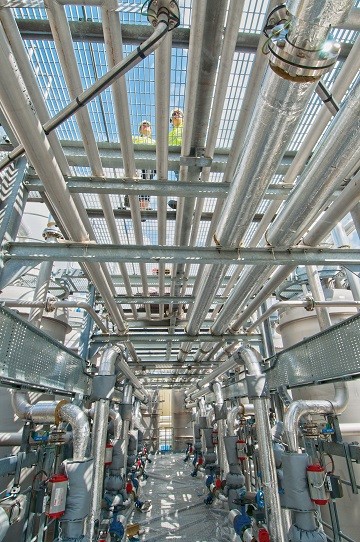- Where We Work
- Interactive Map
- Afghanistan and Pakistan
- Africa
- African Union
- Power Africa
- Trade and Investment Engagement
- Angola
- Benin
- Botswana
- Burkina Faso
- Burundi
- Cameroon
- Central Africa Regional
- Central African Republic
- Chad
- Côte d'Ivoire
- Democratic Republic of the Congo
- Djibouti
- East Africa Regional
- Ethiopia
- Ghana
- Guinea
- Kenya
- Lesotho
- Liberia
- Madagascar
- Malawi
- Mali
- Mauritania
- Mozambique
- Namibia
- Niger
- Nigeria
- Republic of the Congo
- Rwanda
- Sahel Regional
- Senegal
- Sierra Leone
- Somalia
- South Africa
- South Sudan
- Southern Africa Regional
- Sudan
- Swaziland
- Tanzania
- Uganda
- West Africa Regional
- Zambia
- Zimbabwe
- Asia
- Europe and Eurasia
- Latin America and the Caribbean
- Middle East
- Mission Directory

Instead of filling landfills, trash in one region in South Africa will soon be converted into electricity to power more than 10,000 homes.
MBHE African Power, a local renewable energy developer, is constructing South Africa’s first waste-to-energy plant. MBHE received a grant as joint developer of the project from the U.S. Trade and Development Agency (USTDA), one of the 12 Power Africa agencies of the U.S. Government. More recently, the developer selected the U.S. company Black & Veatch to provide technical assistance.
The grant was signed in June by USTDA’s Regional Director for sub-Saharan Africa Lida Fitts and MBHE Director Karl Siegel during the 2016 Infrastructure Africa Conference in Johannesburg.
“USTDA is pleased to support U.S. private sector participation in what is anticipated to be South Africa’s first waste-to-energy plant,” Fitts said. “In addition to increasing local access to affordable, reliable electricity and reducing landfilled waste, the project will help create clean energy jobs in both the United States and South Africa.”
The project, which will be located in the Drakenstein Municipality, near Wellington in the Western Cape, is a public-private partnership that includes the Drakenstein Municipality and Interwaste, a local South African waste management company.
The project represents an opportunity to develop an innovative solution to easing the country’s growing power demands, which in recent years have led to brownouts -- also known as “load shedding,” while also diverting waste from over-burdened regional landfills in an environmentally-friendly fashion.
“The development process will serve as a blueprint for future waste-to-energy projects in Southern Africa and aims to solve a national waste management problem in alleviating the burden on ever depleting landfill airspace,” Siegel said.
South Africa’s first waste-to-energy facility will contribute 10 megawatts (MW) to South Africa’s power grid. The new plant will use wet organic fraction and locally-available municipal waste in an effort to provide electricity from clean burning natural gas to the region.
In addition to providing renewable energy, the new waste management project will help address the region’s limited landfill capacity by using up to 500 tons of municipal waste per day, reducing the area’s waste volume by about 90 percent.
Providing technical assistance to help projects get off the ground is a central pillar of the U.S. Government’s new development model, and Power Africa encourages its partners to support projects with technical know-how and expertise.
With more than 50 years of experience, Black & Veatch has embraced its role as technical advisor for this first-of-its-kind project.
“Partnering with MBHE on this project will help address an increasingly critical waste management challenge facing the community,” said Karen Daniel, chief financial officer and executive leader of Black & Veatch’s sub-Saharan Africa growth initiative. “The completed project will address this issue while also providing a sustainable energy solution to meet growing electricity demand.”
Specifically, Black & Veatch will provide fuel characterisation, front-end engineering and design, and tender support for the plant’s engineering, procurement and construction, operations and maintenance contracts.
This project demonstrates Power Africa’s technical advisory model at work. Power Africa, a U.S. Government-led initiative is committed to providing technical assistance to move public-private partnerships and new energy deals forward, while also contributing to the goal of providing 30,000 MW of cleaner, more efficient electricity generation and 60 million new home and business connections on the continent by 2030.







Comment
Make a general inquiry or suggest an improvement.